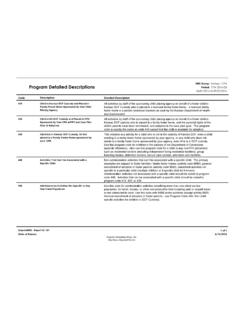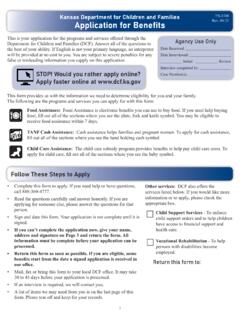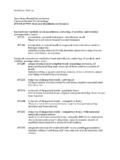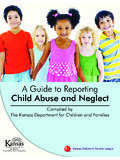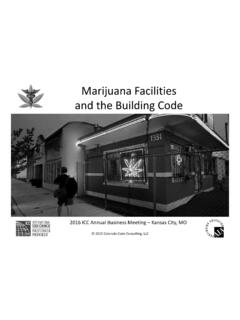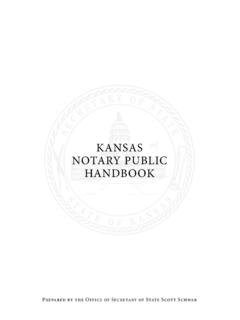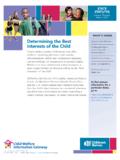Transcription of Child Care Provider Handbook
1 kansas department for Children and Families Child Care Provider Handbook Page | 1 Table of Contents I. Welcome Page 3 II. General Information for All Providers Page 4 A. Provider Responsibilities Page 4 B. Provider Resources Page 6 C. DCF Benefit Rates and Payment Policies Page 7 D. Parent/ Provider Contracts and Policies Page 11 E. Attendance Records Page 12 III. Provider Agreement with DCF Page 13 A. Section 1 Provider Identifying Information Page 13 B. Section 2-9 Terms and Conditions of Provider Agreement Page 13 C. Contractual Provisions Attachment Page 15 IV. Regulated Providers Page 17 V. Unregulated Providers Page 18 VI. Out-of-Home Relative Providers Page 19 VII. In-Home Relative Providers Page 19 VIII. Frequently Asked Questions Page 20 IX. Forms A. Consent for Medical Care Page 23 B. Eligibility Notice Page 25 C. ARU/SIVR Worksheet Page 27 D. Parent/ Provider Contract Examples Page 29 E. Sample Attendance Record Page 33 F.
2 Policy Statement on Discipline Page 35 G. Health & Safety Standards Home Checklist Page 37 H. Adult Abuse Neglect Exploitation Registry Release of Information Page 39 Page | 2 Page | 3 Welcome Thank you for your interest in becoming a kansas department for Children and Families (DCF) Child care Provider for families who may be eligible for DCF Child care assistance. Parents whose children receive subsidy benefits have the option to choose the type of Child care Provider they want to use. There are four types of providers who can enroll with DCF. A Regulated Child care Provider is one who: Has a current KDHE permanent license. If you are not licensed through KDHE, you must first apply and be approved for a license from KDHE before DCF will consider your application to enroll as a regulated Provider . An Unregulated Child care Provider is one who meets either of the following criteria: Is licensed by another state and a CCDF subsidy Provider in that state Is under the jurisdiction of the federal government or a tribe An Out-of-Home Relative Child care Provider is one who: Provides care for a relative s Child outside of that Child s home Is not residing with the Child Is not the Child s own parent, guardian or primary caretaker Must be at least 18 years of age and a grandparent, great-grandparent, sibling or aunt/uncle of the Child .
3 Cousins and great aunts/uncles do not meet the relationship requirement. Is related to all children for whom care will be provided, through marriage, blood relationship or court decree. You may be asked to verify your relationship to each Child . Cares for six or fewer related children under 16 years of age (including the Provider s own children), and provides care for less than 24 hours a day. Must have a referral from a DCF worker to enroll as an Out-of-Home Relative Provider . An In-Home Relative Child care Provider is one who: Is employed by the parent to provide care for a Child in that Child s home Is not residing with the Child Must be at least 18 years of age and a grandparent, great grandparent, sibling, or aunt/uncle of the Child . Cousins and great aunts/uncles do not meet the relationship requirement. Is related to all children for whom care will be provided, through marriage, blood relationship or court decree. You may be asked to verify your relationship to each Child .
4 Is not the Child s own parent, guardian or primary caretaker. Cares for six or fewer children under 16 years of age, (including the Provider s own children if applicable), and provides care for less than 24 hours a day Must have a referral from a DCF worker to enroll as an In-Home Relative Child care Provider . As you review this Handbook , pay particular attention to the section titled General Information for all DCF Providers and the section that corresponds to your Provider type. Page | 4 General Information for All DCF Child Care Providers ALL DCF Child Care Providers must be citizens or legally residing in the with a valid Social Security number. DCF completes extensive background checks on the Provider , household members, age 10 or older, and volunteers (if applicable). These background checks may include a Child Abuse-Neglect Registry check, a check of the Adult Abuse, Neglect, Exploitation Registry, a check of the kansas Adult Supervised Population Electronic Repository (KASPER) and other available registries.
5 Each person must pass a background check before the agreement is approved. A Provider is not eligible to be approved if the names of any of the persons living, working or volunteering in his/her facility appear on the Child Abuse-Neglect Registry, the Adult Abuse, Neglect, Exploitation Registry, KASPER, or has a felony conviction. Approved providers will receive a copy of their signed Provider agreement, which will consist of: The Provider identifying information that you submit on your application to enroll as a DCF Child care Provider (section 1) Sections 2 through 9, as noted in this Handbook as Terms and Conditions of Provider Agreement Contractual agreement attachment (form DA-146a), which is included in this Handbook Policy statement on discipline (see forms section of this Handbook ) for all Provider types except regulated Health and safety standards - home checklist (see forms section of this Handbook ) for out- of-home and in-home relative Child care providers Families who receive DCF subsidy are notified in writing of their Child care subsidy eligibility.
6 The parent receives a copy of his/her Child care plan. The Child care Provider will receive a notice of eligibility for any eligible Child for whom the individual has been named as a Provider . See the example in the forms section of this Handbook . DCF reserves the right to deny or refuse to sign an agreement with any Provider . As this is a business agreement, no reason must be given as to why a request to be a DCF Child Care Provider was denied. Provider Responsibilities: All providers approved by DCF have the following responsibilities: Providers agree to not accept payments for children who reside in their home. Providers agree to receive Child Care subsidy benefits (Electronic Benefits Transfer benefits) from parents only for children actually attending the facility. Benefits are not to be used to hold or reserve a spot for a Child who is not enrolled and not scheduled to attend. Providers must maintain minimum health and safety requirements for the children in care.
7 They must provide a safe and clean environment for children and staff. Providers must return the completed forms in person, by mail or electronically. DCF will return a signed copy of the agreement to providers for their records. DCF has the right to use the Social Security number you provide on your enrollment for computer matches with other organizations, such as the IRS and the Social Security Administration. Page | 5 All Providers, household members (18 and older) and all staff must complete and submit the Adult Abuse, Neglect, Exploitation Central Registry Release of Information. The form is available in the forms section of this Handbook . Please make copies as needed. Providers must obtain information on each Child , as required. Examples may include a health assessment, consent for medical care, documentation of immunization dates, etc. A blank copy of the consent for medical care is included in the forms section of this Handbook . Providers must protect the confidentiality of families information.
8 Providers must comply with applicable discipline policies, as referenced by KDHE and DCF. These policies do not allow spanking or hitting of a Child , even if the parent gives written or verbal permission. Providers must agree to prohibit smoking in the home/facility during hours children are in care. Providers must comply with all applicable city, county, State and federal laws, statutes and regulations, such as, but not limited to, provisions of the Americans with Disabilities (ADA) Act (42 12101 et seq.) Providers must respond to all requests for information by DCF. Providers must record daily attendance and keep signed attendance records for a period of three years, even if the DCF agreement has ended. This is for auditing/review purposes. Providers must keep enrollment records for a period of three years, even if the DCF agreement has ended. This includes the Parent/ Provider Contract. This is for auditing/review purposes. Providers must cooperate and provide copies of documents requested by auditors/reviewers.
9 A financial audit/review of records may occur at any time. Providers must discuss payment policies with parents and provide receipts for ALL payments. See additional information under TAX INFORMATION. The Provider must keep accurate payment records/receipts for a period of three years, even if DCF agreement has ended. This is for auditing/review purposes. Providers must allow parents to have access to their children at any time while in care. Providers must inform parents of their business practices, policies and procedures. Providers must give parents of children in care their tax identification number or Social Security number for their Child care income tax credit. Providers must contact DCF or the local police department if a Child is suspected of being neglected or has been physically, sexually or mentally abused. Providers must provide nutritious meals and snacks. Providers must notify parents in advance of planned absences. Providers must treat DCF families the same as private pay families.
10 All DCF providers agree to enroll and participate in the online course Supporting kansas Families: DCF Child Care Subsidy Program within 60 days of being approved. The course can be found on-line at Page | 6 Provider Resources kansas Quality Network (KQN) KQN is a website offered by the kansas department for Children and Families (DCF) that directs Child care providers, families and communities to resources available for the advancement, support and recognition of continuous quality improvement efforts in Child care in kansas . KQN provides information on Child care assistance and other services available to children and families, including eligibility requirements for early childhood education programs. KQN supports parents with information about how to choose Child care for their families that goes beyond health and safety and assists Child care providers in enhancing their professional skills by providing professional development and other opportunities that will help provide better early-learning experiences for children.
